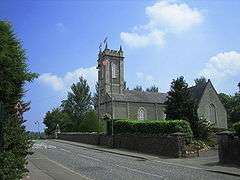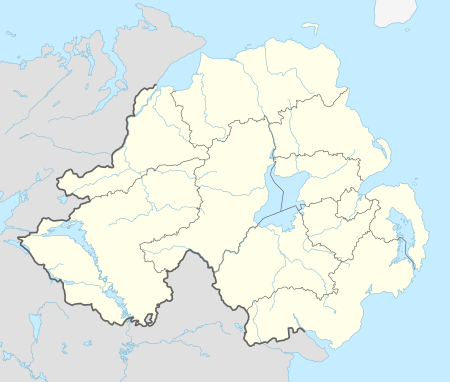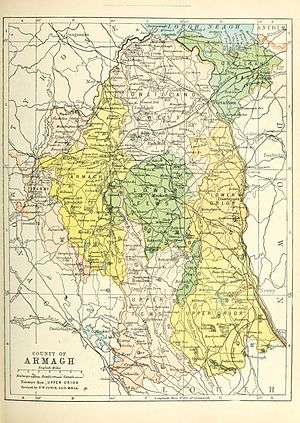Loughgall
Loughgall (/lɒxˈɡɔːl/ lokh-GAWL; from Irish: Loch gCál, meaning "cabbage lake")[1][2] is a small village, townland (of 131 acres) and civil parish in County Armagh, Northern Ireland. It is in the historic baronies of Armagh and Oneilland West.[3] It had a population of 282 people (116 households) in the 2011 Census.[4] (2001 Census: 285 people)
Loughgall
| |
|---|---|
 St Luke's Church of Ireland | |
 Location within Northern Ireland | |
| Population | 282 (2011 Census) |
| Irish grid reference | H908522 |
| District |
|
| County | |
| Country | Northern Ireland |
| Sovereign state | United Kingdom |
| Post town | ARMAGH |
| Postcode district | BT61 |
| Dialling code | 028 |
| UK Parliament | |
| NI Assembly | |
Loughgall was named after a small nearby loch. The village is at the heart of the apple-growing industry and is surrounded by orchards. Along the village's main street is a large set of gates leading to Loughgall Manor. An imposing building, the Manor was once the home of the Cope family who arrived as part of the Plantation of Ulster in the 17th century.
History
In 1795, rival sectarian gangs, the Catholic Defenders and Protestant Peep-o'-Day Boys fought a bloody skirmish called the Battle of the Diamond, that left around 30 people dead. The Orange Order was founded in Dan Winter's House, Loughgall following these events.
The Troubles
For more information see The Troubles in Loughgall, which includes a list of incidents in Loughgall during the Troubles that resulted in two or more fatalities.
On 8 May 1987, eight members of the Provisional Irish Republican Army (IRA) launched a bomb and gun attack on the village's Royal Ulster Constabulary (RUC) station but were intercepted by a Special Air Service (SAS) unit of twenty-four who were aware of the planned attack. The British Army shot dead all of the IRA attackers; a passing civilian was also killed in the exchange of fire and another civilian injured. The incident is known as the Loughgall ambush.
Places of interest
Loughgall Country Park is set in a 188 hectare estate of open farmland & orchards and includes an 18-hole golf course and 37-acre (150,000 m2) coarse fishery.
The NI Horticulture and Plant Breeding Station is set in the Loughgall Manor Estate, surrounded by mature woodlands and overlooking the Lough Gall. The estate was established in the late 17th century by Sir Anthony Cope of Hanwell, Oxfordshire and became the Cope family home for 350 years. In 1947 the estate was purchased from Major-General G.W.R. Templer (later Field Marshal Sir Gerald Templer), a descendant of the original owner, by the (then) Ministry of Agriculture.
Sport
It is home to Loughgall Football Club, which plays in the IFA Championship.
Education
- The Cope Primary School
- There was also a Roman Catholic primary school located on the Eagralougher Road, just outside Loughgall, but due to lack of funding and low enrolment figures the school closed in June 1996.
People
- Poet W. R. Rodgers (1909 – 1969) was ordained as a Presbyterian minister in 1935 and was first appointed to Loughgall Presbyterian Church, Loughgall, where he was minister for 12 years. (Loughgall Presbyterian Church is in the townland of Cloveneden) He later gave up the ministry and became a BBC radio producer and scriptwriter. He died in California in 1969 and was buried in Loughgall.[5]
Civil parish of Loughgall
The civil parish contains the villages of Annaghmore, Charlemont and Loughgall.[3]
The civil parish contains the following townlands:[3]
- Aghinlig
- Altaturk
- Annaghmacmanus
- Annaghmore
- Annasamry
- Ardress East, Ardress West
- Ballygasey
- Ballymagerny
- Ballytyrone
- Borough of Charlemont
- Causanagh
- Clonmain
- Cloven Eden
- Coragh
- Corr and Dunavally
- Derrycoose
- Derrycrew
- Drumart
- Drumharriff
- Drumilly
- Drumnasoo
- Dunavally and Corr
- Eagralougher
- Fernagreevagh
- Keenaghan
- Kinnegoe
- Kishaboy
- Legavilly
- Levalleglish
- Lislasly
- Lisneany
- Lissheffield
- Loughgall
- Mullaghbane
- Mullaghmore
- Mullanasilla
- Rathdrumgran
- Tirmacrannon
- Turcarra
See also
References
- Placenames NI Archived 2012-06-13 at the Wayback Machine
- Placenames Database of Ireland
- "Loughgall". IreAtlas Townlands Database. Retrieved 13 May 2015.
- "Loughgall". Census 2011 Results. NI Statistics and Research Agency. Archived from the original on 22 April 2015. Retrieved 22 April 2015.
- "Introduction - WR Rodgers Papers" (PDF). Public Record Office of Northern Ireland. Retrieved 4 March 2009.
External links
| Wikimedia Commons has media related to Loughgall. |
